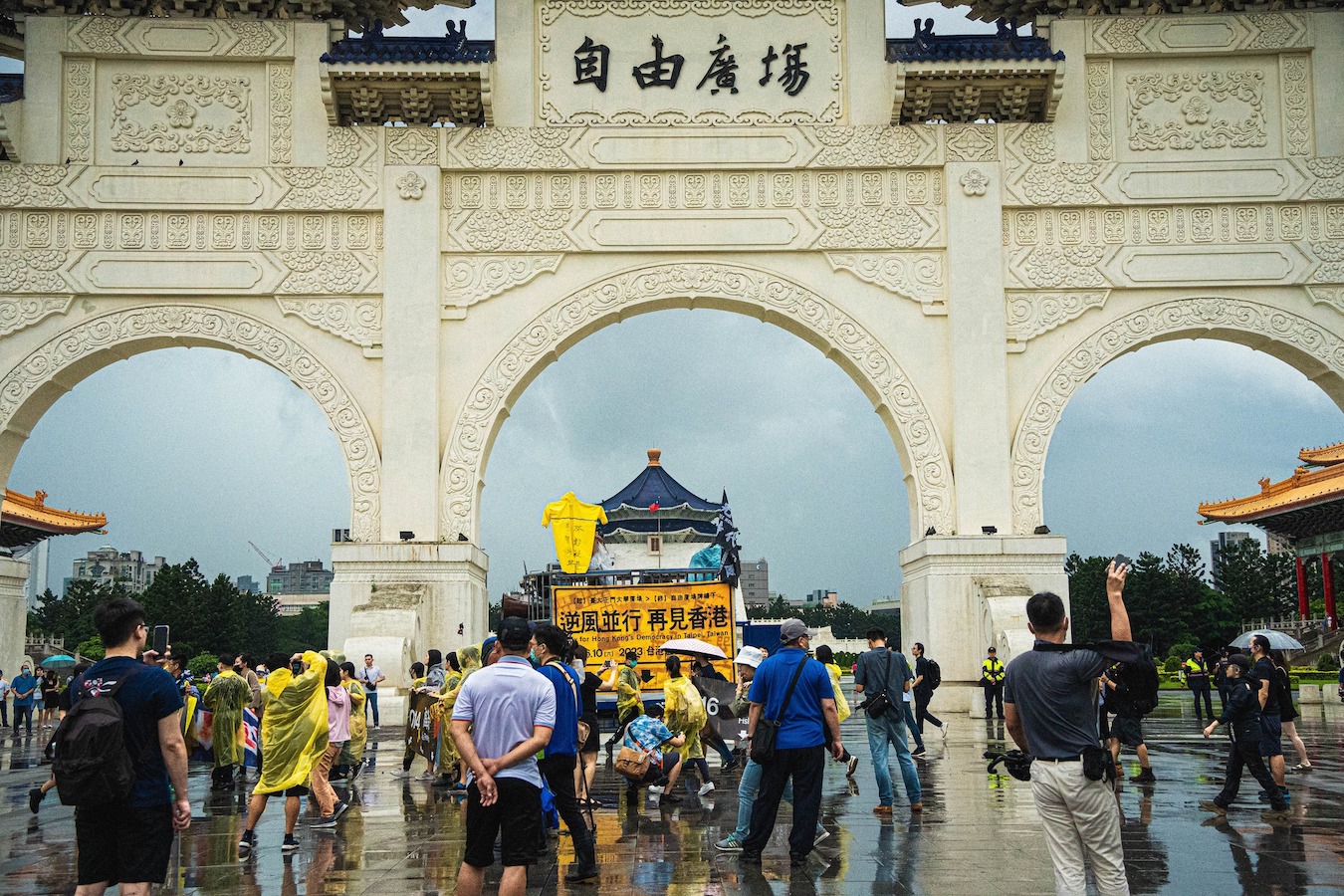by Brian Hioe
語言:
English
Photo Credit: Hong Kong Outlanders/Facebook
HONGKONGERS AND ADVOCATES rallied on Saturday to mark four years since the start of the Anti-ELAB movement in Taipei. Around 600 attended. The rally took place despite bouts of rain.
The rally began at the gate of National Taiwan University, with demonstrators gathering at 2:30 PM. The march set out at 3 PM, after short speeches, arriving at Liberty Plaza at 4 PM. An art exhibition was set up in Liberty Plaza. The rally closed out with demonstrators singing “Glory to Hong Kong,” the anthem of the Hong Kong protests.
Participant groups included many stalwarts of Taiwanese civil society. This included, of course, Hong Kong groups such as the Hong Kong Outlanders and Taiwan-Hong Kong Association, but also Covenants Watch, the Taiwan Association for Human Rights, Judicial Reform Foundation, Taiwan Alliance to End the Death Penalty, Taiwan Forever Association, and the Human Rights Network for Tibet and Taiwan.
The theme of the rally was “Against the wind, see you again Hong Kong.” In particular, many of the organizers of the rally are Hongkongers currently living in Taiwan in the wake of the 2019 protests-the title, then, emphasized not only that such individuals are now living in exile, but also that they hope to travel openly again to Hong Kong one day. Nevertheless, it was noted that participation in the rally could be dangerous even for Hongkongers in Taiwan, seeing as this could cause them to be targeted by the Hong Kong National Security Law.
To this extent, the rally called attention to the plight of Hongkongers currently facing trial. Hong Kong activists drawn from a range of backgrounds currently face charges for their participation in protests or participation in other pro-democracy activities. This includes simply organizing primaries for the pro-democracy camp, to decide candidates to field in elections for the Hong Kong Legislative Council (LegCo). While for many years, this was a regular part of campaigning for the pro-democracy camp, the Chinese government currently frames this as a subversive act aimed at undermining and destroying Hong Kong’s electoral processes, as part of a “mutual destruction” strategy.
The rally was followed up with yesterday by Hongkongers gathering outside of Taipei Main Station to sing “Glory to Hong Kong” and stage a flash mob. The demonstration urged Taiwanese not to put blind faith in promises from Beijing.
More generally, the 2019 protests were part of a longer series of protests contesting the deterioration of political freedoms in Hong Kong. This includes not only the 2014 Umbrella Movement, which involved public spaces in Hong Kong being occupied for months, but also the 2016 Fishball Revolution, in response to police crackdowns on Lunar New Year’s hawkers.
Since then, political freedoms in Hong Kong have continued to deteriorate. Electoral reforms passed by the Hong Kong government further reduced the number of seats in LegCo directly elected by the Hong Kong public, while increasing the number of seats chosen directly by the Hong Kong government. Further changes aimed to do the same regarding District Council seats, seeing as while the position was not previously of great political importance, it took on greater importance when the District Council became one of the last arenas in which pro-democracy groups could still contest the pro-Beijing camp in elections.
 Photo credit: Hong Kong Outlanders/Facebook
Photo credit: Hong Kong Outlanders/Facebook
The fact that the number of Hongkongers has visibly increased in Taiwan in recent years. This has also been reflected in that participants in rallies and demonstrations that raise the threat to Taiwan from China, such as the annual commemoration of the Tiananmen Square Massacre that takes place on June 4th, also see significant numbers of Hong Kong participants.
Nevertheless, it is to be seen what the reaction from Taiwanese society will be. Although President Tsai Ing-wen leveraged on the plight of Hongkongers as part of campaigning for 2020 elections, promising to take measures to assist Hongkongers, there appears to be increased backlash against Hongkongers in the years since. Rather than lower barriers for Hongkongers seeking to reside in Taiwan, proposals have shifted toward extending the amount of time for Hongkongers to qualify for residency in Taiwan. Namely, it appears that many Taiwanese view Hong Kong as having simply become part of China, and that Hongkongers should simply be treated as Chinese–this includes views that Hongkongers could potentially prove to be spies, as Chinese immigrants might be perceived as potentially being.
In the meantime, however, Hongkongers continue to organize in Taiwan. The rally over the past weekend and flash mob are cases in point.

